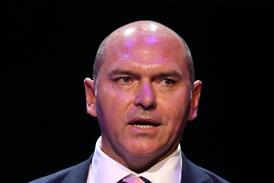Essential insight into NHS matters in the North West of England, with a particular focus on the devolution project in Greater Manchester. Contact me in confidence here.
In this week’s North by North West:
- Lancashire’s controversial pathology plan
- The slow moving stroke reconfiguration
- CCG clear out
- Town hall takeovers in Greater Manchester
Leftfield proposal
Judging by the contents of my digital and old-fashioned mailboxes, plans to consolidate Lancashire’s pathology services have got the blood boiling among many of the staff involved.
The leftfield proposal to create a “hub” for cold tests at Lancaster University was always going to be a tricky one to sell lab workers in the south of the county, who will fear having to relocate or face a daily commute up the M6.
One of the documents I’ve been sent is an analysis of survey responses from affected staff collected last year, which showed a “strongly unfavourable response” to a consolidated “off-site” service (which the university would be).
Most wanted the hub at Royal Preston Hospital, which matched a suggestion put forward by NHS Improvement last year.
Unions are already involved in the discussions, and industrial action looks possible if the proposals remain unchanged.
The East Lancashire question
Subject to business case approval, NHS England has now approved around £31m of capital funding for the pathology project, but it’s not clear whether this funding would also depend on the involvement of East Lancashire Hospitals Trust, which made a late entrance to the collaboration party.
Although the trust has stated its commitment, it formally rejected the strategic outline case because the modelling was carried out on the basis of a three-way collaboration between Lancashire Teaching Hospitals Foundation Trust, Blackpool Teaching Hospitals FT, and University Hospitals of Morecambe Bay FT.
It will need to be remodelled (which may or may not produce materially different scores for the various options), and ELHT will then have to make an in-out decision.
Staff have been asking what would happen to the funding if ELHT stays out, but all they got in a recent internal Q&A document was the following answer: “When the bid was submitted the ELHT position was unclear so the narrative stated that it was modelled for three trusts with East Lancashire Trust entering into the project at a later date.”
Quite a few rivers still to be crossed, from the sounds of it.
Potential conflict
Meanwhile, there have also been questions raised about a potential conflict of interest for Ian Johnson, who has chaired two of the trusts involved.
Mr Johnson, now chair of UHMBFT after switching from BTHFT earlier this year, also chairs the development board for Lancaster University’s “health innovation campus”, which is where the new pathology hub would be sited.
Asked about this, a spokesman said Mr Johnson had “declared his interest throughout” and the location was suggested as part of discussions between clinical staff. He said appropriate evaluation criteria were used and there was “no external influence”.
Conversations had also been ongoing with the University of Central Lancashire, in Preston, but there were no potential sites identified, he added.
Stroke reconfiguration
Discussions about consolidating specialist acute care in Lancashire have been taking place for years, but I’m hearing some solid proposals are almost ready.
There are currently five acute stroke units – in Blackburn, Preston, Blackpool, Barrow and Lancaster – and my guess would be that three of those would remain, with one becoming a hyper-acute unit.
CCG clear out
The clear out of Lancashire’s clinical commissioning groups continues, with East Lancashire’s accountable officer Mark Youlton announcing he’ll retire at the end of the year. As with Blackburn with Darwen, I doubt there will be a like-for-like replacement, and the two Pennine Lancashire CCGs could instead consider a shared managing director.
We could also see something similar between the Blackpool and Fylde and Wyre CCGs in the coming months, as decision making and key personnel switch to the emerging “integrated care system board” for Lancashire and South Cumbria.
Town hall takeover
The town hall takeover of CCGs continues in Greater Manchester, with Wigan council chief executive Donna Hall taking on the CCG accountable officer role on a dual basis. Trish Anderson left the AO role at the end of May.
As in Trafford and Oldham, it doesn’t sound like the new arrangements, and the way they were brought about, were universally supported.
Topics
- Acute care
- BLACKPOOL TEACHING HOSPITALS NHS FOUNDATION TRUST
- EAST LANCASHIRE HOSPITALS NHS TRUST
- LANCASHIRE TEACHING HOSPITALS NHS FT
- Morecambe Bay CCG
- NHS Blackburn with Darwen CCG
- NHS Blackpool CCG
- NHS Chorley and South Ribble CCG
- NHS East Lancashire CCG
- NHS England (Commissioning Board)
- NHS Fylde and Wyre CCG
- NHS Greater Preston CCG
- NHS Improvement
- NHS Manchester CCG
- NHS Oldham CCG
- NHS Salford CCG
- NHS Stockport CCG
- NHS Trafford CCG
- NHS Wigan Borough CCG
- North West
- UNIVERSITY HOSPITALS OF MORECAMBE BAY NHS TRUST



























No comments yet